Cubes And Cube Roots
Exercise 6.1
1). Which of the following are not perfect cubes?
(i) 216 (ii) 128
(iii) 1000 (iv) 100
(v) 46656
Solution:
(i) 216
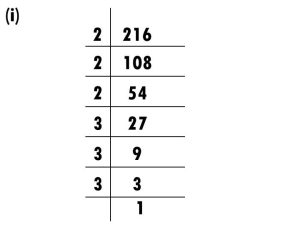
216 = 2 X 2 X 2 X 3 X 3 X 3
216 = 2 X 2 X 2 X 3 X 3 X 3
Group of factors 2 and 3 is formed
Therefore, 216 is a perfect cube.
(ii) 128

128 = 2 X 2 X 2 X 2 X 2 X 2 X 2
128 = 2 X 2 X 2 X 2 X 2 X 2 X 2
in this factorisation, factor 2 cannot be formed in groups of 3 Therefore, 128 is not a perfect cube.
(iii) 1000
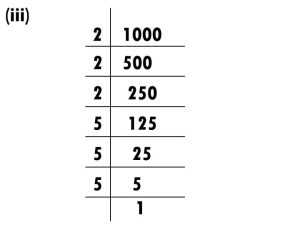
1000 = 2 X 2 X 2 X 5 X 5 X 5
1000 = 2 X 2 X 2 X 5 X 5 X 5
in this factorisation, group of three of factors 2 and 5 is formed
Therefore, 1000 is a perfect cube.
(iv) 100

100 = 2 X 2 X 5 X 5
in this factorisation, factors 2 and 5cannot be formed in groups of 3
Therefore, 100 is not a perfect cube.
(v) 46656

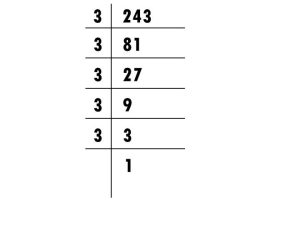
46656 = 2 X 2 X 2 X 2 X 2 X 2 X 3 X 3 X 3 X 3 X 3 X 3
46656 = 2 X 2 X 2 X 2 X 2 X 2 X 3 X 3 X 3 X 3 X 3 X 3
in this factorisation, group of three of factors 2 and 3 formed therefore, 46656 is a perfect cube.
2). Find the smallest number by which each of the following numbers must be multiplied to obtain a perfect cube.
(i) 243 (ii) 256
(iii) 72 (iv) 675
(v) 100
Solution:
(i) 243
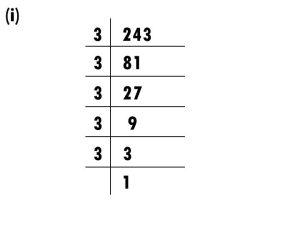
243 = 3 X 3 X 3 X 3 X 3
243 = 3 X 3 X 3 X 3 X 3
Here one 3 is required to make the group of three
The least number multiplied to obtain a perfect cube = 3
(ii) 256

256 = 2 X 2 X 2 X 2 X 2 X 2 X 2 X 2
256 = 2 X 2 X 2 X 2 X 2 X 2 X 2 X 2
Here one 2 is required to make the group of three
The least number multiplied to obtain a perfect cube = 2
(iii) 72
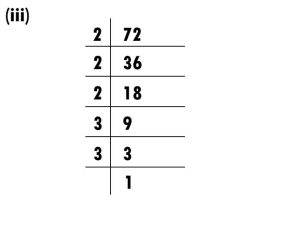
72 = 2 X 2 X 2 X 3 X 3
72 = 2 X 2 X 2 X 3 X 3
Here one 3 is required to make the group of three
The least number multiplied to obtain a perfect cube = 3
(iv) 675
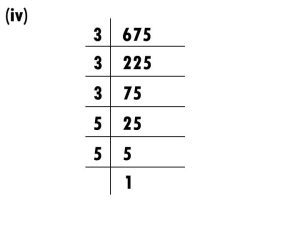
675 = 3 X 3 X 3 X 5 X 5
675 = 3 X 3 X 3 X 5 X 5
Here one 5 is required to make the group of three
The least number multiplied to obtain a perfect cube = 5
(v) 100
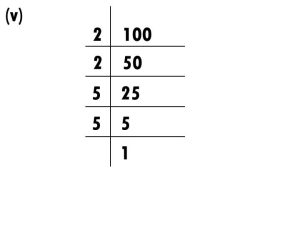
100 = 2 X 2 X 5 X 5
Here one 2 and one 5 is required to make the group of three
The least number multiplied to obtain a perfect cube = 2 X 5
= 10
3). Find the smallest number by which each of the following numbers must be divided to obtain a perfect cube.
(i) 81 (ii) 128
(iii) 135 (iv) 192
(v) 704
Solution:
(i) 81

81 = 3 X 3 X 3 X 3
81 = 3 X 3 X 3 X 3
Here 3 is the number by which 81 is divided to get a perfect cube
The least number to be divided to obtain a perfect cube = 3
(ii) 128
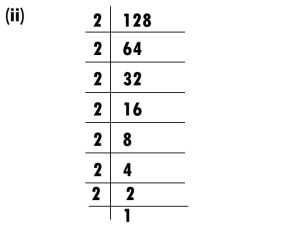
128 = 2 X 2 X 2 X 2 X 2 X 2 X 2
128 = 2 X 2 X 2 X 2 X 2 X 2 X 2
Here 2 is the number by which 128 is divided to get a perfect cube
The least number to be divided to obtain a perfect cube = 2
(iii) 135
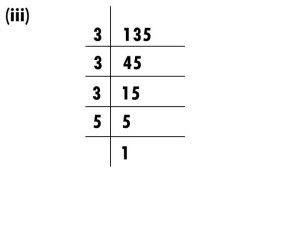
135 = 3 X 3 X 3 X 5
135 = 3 X 3 X 3 X 5
Here 5 is the number by which 135 is divided to get a perfect cube
The least number to be divided to obtain a perfect cube = 5
(iv) 192
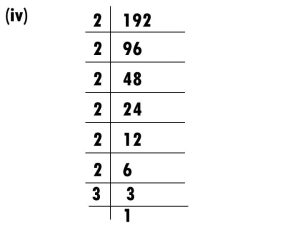
192 = 2 X 2 X 2 X 2 X 2 X 2 X 3
192 = 2 X 2 X 2 X 2 X 2 X 2 X 3
Here 3 is the number by which 192 is divided to get a perfect cube
The least number to be divided to obtain a perfect cube = 3
(v) 704
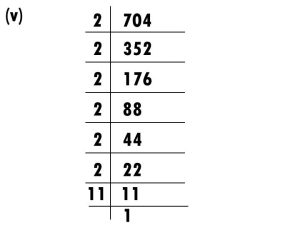
704 = 2 X 2 X 2 X 2 X 2 X 2 X 11
704 = 2 X 2 X 2 X 2 X 2 X 2 X 11
Here 11 is the number by which 704 is divided to get a perfect cube
The least number to be divided to obtain a perfect cube = 11
4). Parikshit makes a cuboid of plasticine of sides 5 cm, 2 cm, 5 cm. how much such cuboids will he need to form a cube?
Sides of cuboid of plasticine are 5 cm, 2 cm and 5 cm
Volume of cuboid = 5 X 5 X 2
To make it perfect cube we have to make a group of three of factors 5 and 2.
Cuboids need to form a cube = 5 X 2 X 2
= 20
Click here for the solutions of Std 8 Maths
1). Rational Numbers
2). Linear Equations in One Variable
3). Understanding Quadrilaterals
4). Data Handling
5). Squares and Square Roots
6). Cubes and Cube Roots
![]()